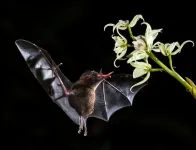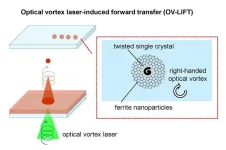(Press-News.org) University of Washington Researchers Take Flight with New Insights on Bat Evolution
Video Interview with Authors - https://youtu.be/6rogrh2_HN0
In new research published in PeerJ Life & Environment, researchers from the University of Washington, University of Texas at Austin and Oregon Institute of Technology, led by undergraduate student Abby Burtner, have advanced our understanding of the evolutionary origins of flight in bats. The study, titled "Gliding toward an Understanding of the Origin of Flight in Bats," employs phylogenetic comparative methods to explore the evolutionary transition from gliding to powered flight in these unique mammals.
Bats are the only mammals capable of powered flight, a feat enabled by their highly specialized limb morphology. However, the evolutionary pathway that led to this capability has remained elusive due to an incomplete fossil record. Burtner et al.'s research provides significant insights by testing the hypothesis that bats evolved from gliding ancestors.
The research team analyzed a comprehensive dataset of limb bone measurements that included four extinct bats and 231 extant mammals with various locomotor modes. Their findings reveal that gliders exhibit relatively elongate forelimb and narrower hindlimb bones that are intermediate between those of bats and non-gliding arboreal mammals. Evolutionary modeling of these data offers support for the hypothesis that selection may be strong on certain forelimb traits, pulling them from a glider towards a flyer adaptive zone in bats.
"We propose an adaptive landscape of limb bone traits across locomotor modes based on the results from our modeling analyses," said Dr. Santana. "Our results, combined with previous research on bat wing development and aerodynamics, support a hypothetical evolutionary pathway wherein a glider-like forelimb morphology preceded the evolution of specialized bat wings"
This study not only supports the gliding-to-flying hypothesis but also challenges the traditional view of bat and glider limb evolution. The researchers emphasize the need for future studies to test the biomechanical implications of these bone morphologies and to consider the complex genetic and ecological factors that influenced the evolution of bat powered flight.
"Our findings contribute to the hypothesis that bats evolved from gliding ancestors and lays a morphological foundation in our understanding of bat flight” Dr. Law added. "However, we stress that additional fossils are necessary to truly unravel the mysteries of this remarkable evolutionary transition."
For more information on this study or to arrange an interview with Dr. Law or Dr. Santana, please contact the University of Washington’s Department of Biology.
END
University of Washington researchers take flight with new insights on bat evolution
2024-07-25
ELSE PRESS RELEASES FROM THIS DATE:
Tanzanian officials praise NEST360 contribution to newborn care
2024-07-25
HOUSTON – (June 25, 2024) – Rice University President Reginald DesRoches joined Rice360 Institute for Global Health Technologies Co-Director Maria Oden and Rice360 supporters on a trip to Africa this summer marking significant milestones on the road to ending preventable newborn deaths in the sub-Saharan region. Rice360 is one of 22 organizations in the Newborn Essential Solutions and Technologies (NEST360) international alliance, and this trip signified Rice’s continued collaboration ...
4D Medicine raises £3.4 million for unique biomaterial platform
2024-07-25
4D Medicine, a spin-out from the Universities of Birmingham and Warwick has raised £3.4m ($4.4m) in a Series A investment.
The funding round was backed by Oshen Holdings, DSW Ventures, SFC Capital, Boundary Capital and private investors including several leading scientists and surgeons. It will enable the company to complete pre-clinical testing of its first product range and seek FDA clearance for entry into the US market.
4D is a UK-based company whose innovative biomaterial has potential to be used for a wide range of 3D printed implants and surgical devices. Its product 4Degra is a resorbable biomaterial that is being used to develop ...
Ancient marine animal had inventive past despite being represented by few species, new study finds
2024-07-25
The findings, published today in Nature Ecology & Evolution, sheds light on some core principles of the evolution of modern biodiversity.
In current oceans, molluscs such as clams, oysters, and snails are hugely diverse, with over 50,000 species, whereas brachiopods are rare by comparison with only 394 species known. But this was not always the case. The team have found that brachiopods were evolving new shell shapes and ecological behaviours following the end-Permian mass extinction which compromised their numbers.
“In the Palaeozoic, from 540 to 250 million years ago, brachiopods ruled the seabed,” ...
Quantum sensor for the atomic world developed through international scientific collaboration
2024-07-25
In a scientific breakthrough, an international research team from Germany's Forschungszentrum Jülich and Korea's IBS Center for Quantum Nanoscience (QNS) developed a quantum sensor capable of detecting minute magnetic fields at the atomic length scale. This pioneering work realizes a long-held dream of scientists: an MRI-like tool for quantum materials.
The research team utilized the expertise of bottom up single-molecule fabrication from the Jülich group while conducting experiments at QNS, utilizing the Korean team’s leading-edge ...
The research was wrong: study shows moderate drinking won’t lengthen your life
2024-07-25
PISCATAWAY, NJ – Probably everyone has heard the conventional wisdom that a glass of wine a day is good for you--or you’ve heard some variation of it. The problem is that it’s based on flawed scientific research, according to a new report in the Journal of Studies on Alcohol and Drugs.
Over the years, many studies have suggested that moderate drinkers enjoy longer lives with lower risks of heart disease and other chronic ills than abstainers do. That spurred the widespread belief that alcohol, in moderation, can be a health tonic. However, not all studies have painted such a rosy picture--and the ...
Save your data on printable magnetic devices? New laser technique’s twist might make this reality
2024-07-25
The proliferation of all things digital doesn’t mean that printing technology is no longer relevant. In fact, printing technology is required to make the semiconductors necessary for the digital world. And as an Osaka Metropolitan University-led team has shown using a new printing technique, printable magnetic devices for high-density data storage might soon be realized.
Dr. Ken-ichi Yuyama, a lecturer at the Graduate School of Science, and his colleagues report in APL Materials on the development of a new type of laser-induced forward transfer ...
Early onset dementia more common than previously reported – the incidence of Alzheimer’s disease seems to be on the rise
2024-07-25
A new major study by the University of Eastern Finland, the University of Oulu and Neurocenter Finland explored early-onset dementia in the working-age population in Finland. The study cohort was one of the largest in the world to date, and the findings were published on 24th of July 2024 in Neurology®, the medical journal of the American Academy of Neurology.
Current epidemiological data on early-onset dementia is scarce and based on small study cohorts, with no recent data from Finland available. For the present ...
Pesticides potentially as bad as smoking for increased risk in certain cancers
2024-07-25
In modern day agriculture, pesticides are essential to ensure high enough crop yields and food security. These chemicals, however, can adversely affect plant and animal life as well as the people exposed to them.
Now, in a population-based, nation-wide study, researchers in the US have put increased cancer risk through agricultural pesticide use into context with smoking, a better understood cancer risk factor. The results were published in Frontiers in Cancer Control and Society.
“In our study we found that for some cancers, the effect of agricultural pesticide usage is comparable in magnitude to the effect of smoking,” said the study’s ...
NUS researchers develop new battery-free technology to power electronic devices using ambient radiofrequency signals
2024-07-25
Ubiquitous wireless technologies like Wi-Fi, Bluetooth, and 5G rely on radio frequency (RF) signals to send and receive data. A new prototype of an energy harvesting module – developed by a team led by scientists from the National University of Singapore (NUS) – can now convert ambient or ‘waste’ RF signals into direct current (DC) voltage. This can be used to power small electronic devices without the use of batteries.
RF energy harvesting technologies, such as this, is essential as they reduce battery dependency, extend device lifetimes, minimise environmental impact, and enhance the feasibility of wireless sensor networks and IoT devices in remote ...
New protein discovery may influence future cancer treatment
2024-07-25
Researchers from the University of Otago, Christchurch, have spearheaded the discovery of a protein function which has the potential to guide the development of novel cancer treatment options and improve the diagnosis of various cancers.
The exciting research finding, carried out alongside Dr Vanessa Morris from the University of Canterbury’s School of Biological Sciences as well as researchers in Australia and Denmark, centres on the activity of a tumour- suppressing protein called p16.
The discovery, published in the British scientific journal Nature Communications and first authored by ...







